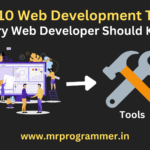CMS Or Content Management System Refers to a System Which Is Used To Manage & Create Digital Content. Over 73 million Websites Use CMS. There 64.9% CMSes Which Use WordPress.
There are many different types of CMS available, ranging from simple systems that allow users to manage and publish content on a single website, to more complex enterprise-level systems that support the management of large volumes of content across multiple websites and channels. Some CMSes are open source, which means that the source code is available for users to modify and distribute freely. Other CMSes are proprietary, meaning that the source code is owned by a company and is not available for users to modify.
One of the main benefits of using a CMS is that it allows non-technical users to easily create, edit, and publish content without requiring any coding knowledge. This makes it possible for organizations to quickly and easily update their websites and digital platforms and helps to ensure that the content is current and relevant.
Another benefit of using a CMS is that it can help to improve search engine optimization (SEO). Many CMSes have built-in features that allow users to optimize their content for search engines, such as the ability to add metadata and alt text to images, and the ability to create custom URLs and titles for pages. This can help to improve the visibility of a website in search engine results, which can lead to more traffic and potential customers.
In addition to these benefits, CMSes can also help to streamline the workflow and collaboration process within an organization. They often include features such as version control, which allows users to track changes to the content and revert to previous versions if necessary, and the ability to assign tasks and permissions to different users. This can help to ensure that content is reviewed and approved before it is published, and can help to prevent errors or inconsistencies.
Some popular CMSes are:
- WordPress
- Joomla
- Drupal
- Magento
These systems are widely used by individuals and organizations of all sizes and offer a range of features and functionality to meet different needs.
There are also many specialized CMSes available for specific industries or use cases. For example, there are CMSes that are specifically designed for e-commerce, and others that are optimized for managing large volumes of technical documentation.
When choosing a CMS, it’s important to consider the needs and goals of your organization, as well as the level of technical expertise of your team. Some CMSes may be more suited to certain types of organizations or content, so it’s important to carefully evaluate the options and select a system that will meet your needs.
Overall, a CMS is a powerful tool that can help organizations to effectively manage and publish their digital content. Whether you’re running a small blog or a large corporate website, a CMS can help to streamline the content creation and publishing process, and can help to improve the visibility and reach of your content.
- I Tried ChromeOS Flex After Switching From Windows 10 - October 13, 2025
- Top 5 Business Skills Every Programmer Needs to Get Hired (2025 Guide) - August 27, 2025
- Intel’s Downfall? How a Silicon Titan Lost the Plot—and What Comes Next - August 26, 2025







